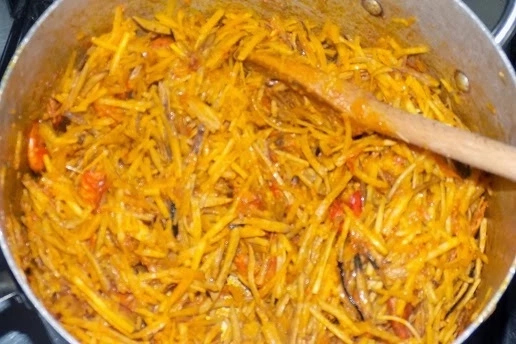How To Make Nigerian Abacha (African Salad)
Abacha, popularly referred to as ‘’African salad’’ is a delicacy common to the Igbo tribe of Nigeria. Abacha made by Nkanu people of Enugu state is known to be very special and extra delicious. In the article I will be walking you through making your own abacha like a true Nkanu person.
Abacha is a meal that can be eaten either as a snack, side dish or as a very filling main dish. It is prepared from shredded cassava (abacha) and lots of vegetables, local spices and protein in form of meat and fish.
👉 Relocate to Canada Today!
Live, Study and Work in Canada. No Payment is Required! Hurry Now click here to Apply >> Immigrate to CanadaThe nutritional benefits of abacha cannot possibly be overemphasised. It is literally a fully balanced meal packed with the right amounts of carbohydrates (shredded cassava/abacha) , protein ( meat, fish and oil bean seed) , oil (palm oil) , vitamins and minerals ( vegetables).
Read Also: How to Prepare Abacha in Nigeria [African Salad]

Because abacha is prepared with mostly local ingredients that may be unfamiliar to none Nigerian or none Igbo readers, I will include a brief rundown (description, alternative names and preparation before consumption) of the local ingredients so you know exactly what to look out for when you go shopping to try this out.
Recipe
Abacha [80grams] This is shredded cassava. It can either be bought in its crisp dry form or it can be prepared from scratch from cassava tubers. First the cassava tubers have to be washed and boiled for say 20 minutes.
They are then allowed to cool; after which they are sliced with special graters into small long shreds. These shreds are soaked overnight, washed thoroughly and then can be sun dried till crisp for preservation, or they can be used that way for making the African salad.
Ugba or Ukpaka – [3 wraps] this is African oil bean seed. Its botanical name is Pentaclethra Macrophylla and is referred to as agara by the Yoruba people. In its fresh unfermented form it contains a poisonous alkaloid, paucine , caffeoylputrescine, E. coli and Staphylococcus aureus.
It therefore has to undergo fermentation before it is rid of these toxins. Ugba is extremely rich in protein, (20 essential amino acids), phosphorous, magnesium, iron, vitamins, calcium, manganese and copper. It is therefore suitable for maintaining eye sight, helps with depression and insomnia and also as an antibiotic.
Garden eggs – referred to as Solanum Melongena, botanically. For abacha both its fruit and seeds are used to prepare abacha. They are both rich in vitamins and minerals and hence do not have any prescribed quantity for abacha. One can put in as much as he/she can eat.
👉 Relocate to Canada Today!
Live, Study and Work in Canada. No Payment is Required! Hurry Now click here to Apply >> Immigrate to CanadaRead Also: 20 Most Popular Foods in Nigeria That Will Make You Beg For More
a. Ehu/Ogiri – local spice
b. Salt – [a pinch]
c. Seasoning cubes – [2 cubes]
d. Pepper
e. Potash[optional]
f. Onions
g. Palm oil
h. Meat – [kanda/ ponmo/cow skin]
i. Fish – [smoked or boiled]
j. Crayfish [ground]
Method
a. Put in the desired amount of abacha. Roughly 60g for 3 servings. Note that the abacha actually shrinks when its soaked in water while choosing a quantity.
b. If you are using the dried abacha [which is most common], soak in cold water for about 10-20 minutes till its soft. Or pour hot water over it and then drain almost immediately to ensure it doesn’t get soggy.
Read Also: How to Start Food Delivery Business in Nigeria
c. Season and boil the cow skin and fish separately. Ensure the cow skin is boiled till its very tender. Boil in very little water to ensure you get a very thick stock.
d. Frying the fish is optional.
e. Pour 2 cooking spoonfuls of palm oil in a pot and put over low heat.
f. Dissolve the potash in water and sieve off the little sand particles or bits that refused to dissolve.
g. Stir the dissolved potash into the heating oil.
h. Stir in the ground crayfish, salt, pepper, ogiri and seasoning cubes.
i. Stir continuously on this low heat till a paste is formed. This should take about 5-10 minutes.
j. Stir in the meat stock and heat some more.
k. You can choose to put in the onions at this point if you don’t wish to eat them raw but if you don’t mind an extra crunch from the onions then reserve it till the very end.
l. Add the abacha and stir constantly till they are all evenly mixed and the abacha is evenly coloured throughout.
m. Turn off heat.
n. Wash the ukpaka thoroughly in cold water.
o. Place in a separate pan and season with salt, pepper, seasoning cubes and a little palm oil.
p. Stir properly and set aside to be used as a garnish.
q. Slice the garden egg leaves and garden eggs themselves, as much as you can eat, in little bits and use as a garnish.
r. Serve as desired with the cow skin and fish.
Method II
This method of preparing abacha is very quick and does not require heat except for boiling the meat and frying the fish.
You may notice that I keep mentioning, ’frying the fish’’, this is because abacha goes best with fried fish but it is not a compulsory component of the delicacy.
Read Also: 8 Best Yoruba Foods You Should Not Miss
a. Put in the desired amount of abacha. Roughly 60g for 3 servings.
b. If you are using the dried abacha [which is most common], soak in cold water for about 10-20 minutes till its soft. Or pour hot water over it and then drain almost immediately as written above.
c. Season and boil your cow skin till it’s very tender.
d. Fry the fish.
e. After the abacha has been strained put it in a dry bowl.
f. Wash the ukpaka thoroughly in clean cold water.
g. Pour the ukpaka in the abacha.
h. Put in the ogiri, salt, pepper, seasoning cubes, ground cray fish.
i. Stir continuously and thoroughly till properly mixed.
j. Add a dash of palm oil and onions.
k. Stir continuously and thoroughly preferably using your bare hand in other to ensure an even consistency.
l. You can add more oil as required and keep stirring till an even consistency is obtained.
m. Wash and slice the garden egg leaves and the garden eggs themselves to desired sizes.
Read Also: 10 Factors Responsible for High Cost of Food Items in Nigeria and Solutions
n. Use as a garnishing.
o. Feel free to taste at intervals while stirring to check for salt and seasoning.
Your delicious abacha is now ready to be served alongside a cool drink. Enjoy.! Cheers!!







